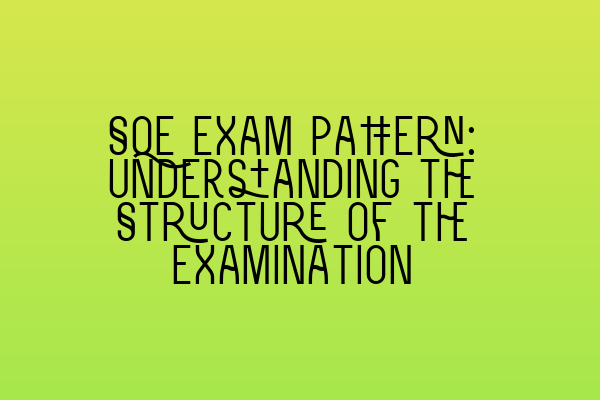SQE Exam Pattern: Understanding the Structure of the Examination
Introduction
Are you preparing for the Solicitors Qualifying Examination (SQE) and feeling overwhelmed? Don’t worry, we’ve got you covered. In this article, we will delve into the SQE exam pattern and help you gain a comprehensive understanding of the structure of the examination.
What is the SQE?
The Solicitors Qualifying Examination (SQE) is a standardized assessment that aspiring solicitors in the UK must pass in order to qualify. The SQE has replaced the previous Qualifying Law Degree (QLD) and Legal Practice Course (LPC) as the new pathway to becoming a solicitor.
Structure of the SQE
The SQE is divided into two stages: SQE1 and SQE2. Let’s take a closer look at each stage:
SQE1
SQE1 is an objective multiple-choice examination that tests candidates on their understanding of legal principles and their application. It consists of two parts:
- Functioning Legal Knowledge (FLK) – In this section, candidates are assessed on their knowledge and understanding of the law, including subjects such as criminal law, contract law, and property law. It tests candidates’ ability to apply the law to practical scenarios.
- Practical Legal Skills (PLS) – This section assesses candidates’ practical skills, such as legal research, writing, and drafting. Candidates may be presented with tasks such as analyzing a case or drafting a legal document.
It’s important to note that SQE1 can be taken at any time, either before or after completing a qualifying law degree or equivalent.
SQE2
SQE2 is a series of practical assessments that test candidates’ ability to apply their legal knowledge and skills in a realistic legal context. It consists of the following elements:
- Client Interviewing and Attendance Note – This assessment evaluates candidates’ ability to interview clients effectively and take accurate attendance notes.
- Advocacy and Case Analysis – In this assessment, candidates are required to analyze a case and present their findings orally.
- Legal Research – Candidates are given a research task and must provide a written response, demonstrating their ability to find and analyze legal information.
- Legal Writing and Drafting – This assessment assesses candidates’ ability to write clear and concise legal documents, such as contracts or witness statements.
- Legal Drafting and Writing – Candidates are given a piece of legislation or a legal problem and must draft a relevant document.
SQE2 can only be taken once candidates have passed SQE1.
Preparing for the SQE
Now that you have a good understanding of the structure of the SQE, it’s important to prepare effectively for the examination. Here are a few tips to help you succeed:
1. Develop a Study Plan
Create a study plan that outlines the topics you need to cover, the resources you will use, and a realistic timeline for your preparation. This will help you stay organized and ensure you cover all the necessary material.
2. Practice Past Papers
Practice with past papers and sample questions to familiarize yourself with the exam format and to assess your understanding of the topics. This will also help you manage your time effectively during the examination.
3. Seek Professional Guidance
Consider enrolling in a comprehensive SQE training program or seeking guidance from experienced solicitors who can provide valuable insights and advice on how to approach the exam successfully.
4. Stay Updated with Legal Developments
Stay up-to-date with current legal developments and updates, as the SQE may incorporate recent changes in the law into the examination. Subscribing to legal publications and attending relevant workshops or seminars can help you stay informed.
By following these tips and putting in the necessary effort and dedication, you can increase your chances of success in the SQE.
Conclusion
The SQE is a significant milestone on your journey to becoming a solicitor. Understanding its structure and preparing effectively will greatly enhance your chances of success. Remember to stay focused, practice regularly, and seek guidance when needed. Good luck with your SQE preparation!
Related Articles:
- Tenant Rights in the UK: Understanding Your Legal Protections
- Examining the Intricacies of Land Law in the UK
- Legal Considerations in Residential Leases: Essential Insights for Solicitors
- Workshops on Land Law: Interactive Learning for Aspiring Property Law Professionals
- Lease Laws in the UK: Unraveling the Legal Framework for Tenants

Leave a Reply